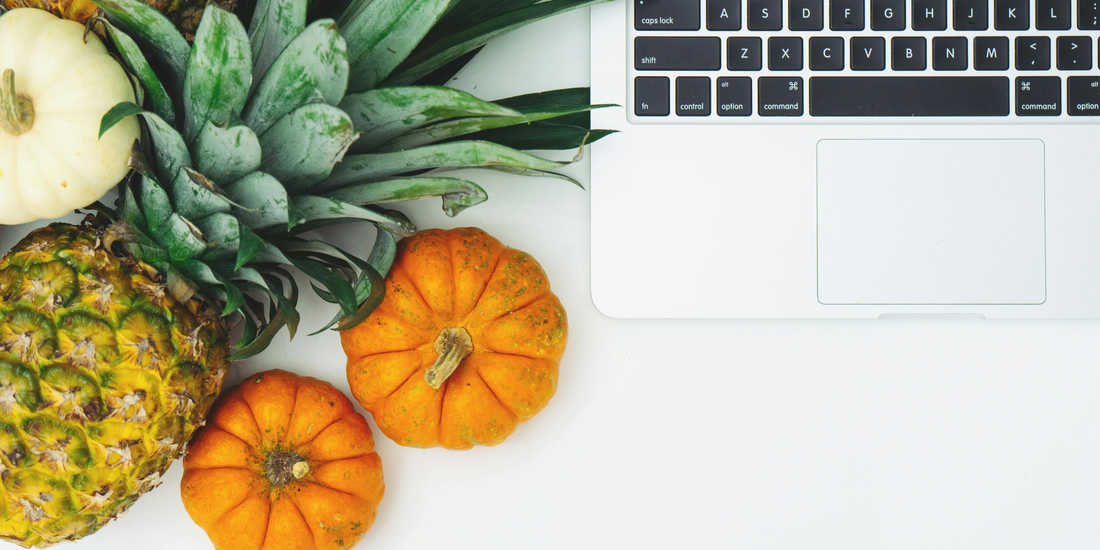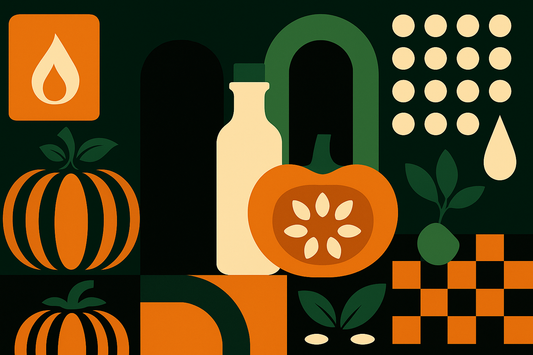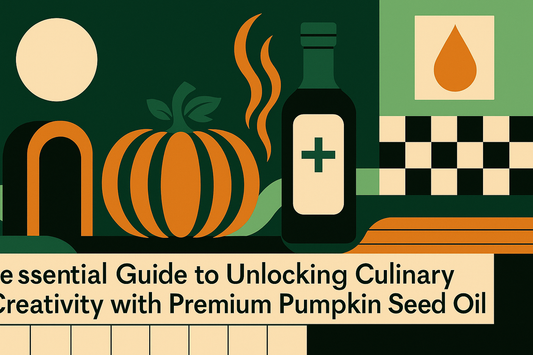
10 Health Benefits of Pumpkin Seed Oil: Why You Should Include It in Your Diet
Sarah discovered something fascinating during her trip to Slovenia. In every local kitchen, she found the same bottle of dark green oil that families had been using for 270 years.
This wasn't just any cooking oil. It was a nutritional powerhouse that Styrian families considered essential to their daily meals.
Here's what makes this traditional European superfood so special.
What Makes Styrian Pumpkin Seed Oil Unique?
Belvoro's pumpkin seed oil comes from hull-less Styrian Prekmurje pumpkins grown in Slovenia's mineral-rich soil.
The seeds are roasted slowly using a 270-year-old family tradition, then pressed to create an oil with a distinctive nutty flavor and impressive nutritional profile.
This isn't your typical cooking oil. The traditional roasting process creates unique compounds you won't find in cold-pressed oils.
The Nutritional Powerhouse Inside Every Drop
Essential Fatty Acids
- Omega-3 (Alpha-linolenic acid): Essential for brain and heart health
- Omega-6 (Linoleic acid): Important for skin and immune function
- Omega-9 (Oleic acid): Supports overall cardiovascular wellness
Vitamins and Minerals
- Vitamin E: Powerful antioxidant that protects cells
- Zinc: Essential for immune function and wound healing
- Magnesium: Supports muscle and nerve function
- Iron: Important for oxygen transport
Unique Plant Compounds
- Phytosterols: Plant compounds that may help with cholesterol management
- Carotenoids: Antioxidants that give the oil its green color
- Tocopherols: Natural vitamin E compounds
1. Heart-Healthy Fatty Acid Profile
What's inside: Balanced omega-3, 6, and 9 fatty acids plus phytosterols.
European families have long considered pumpkin seed oil part of a heart-healthy diet. The oil contains the same beneficial fats found in nuts and seeds that nutritionists recommend for cardiovascular wellness.
How Europeans use it: Drizzled over salads, mixed into vinaigrettes, or added to soups as a finishing oil.
Daily amount: Most European families use 1-2 tablespoons daily in their cooking.
2. Zinc for Immune and Skin Support
What's inside: One of the highest zinc contents of any culinary oil.
Zinc is essential for immune function, wound healing, and maintaining healthy skin. Many people don't get enough zinc from their regular diet.
European tradition: Particularly valued during cold seasons when immune support is most needed. Many families combine it with other nutritious oils, though pumpkin seed oil offers unique advantages over flaxseed oil for zinc content.
Nutritional boost: Just one tablespoon provides a significant portion of your daily zinc needs.
3. Vitamin E for Antioxidant Protection
What's inside: High levels of gamma-tocopherol, a potent form of vitamin E.
This antioxidant helps protect your cells from daily damage caused by pollution, stress, and normal aging processes. The roasting process actually concentrates these protective compounds.
Traditional use: European women have long used pumpkin seed oil both internally and on their skin for its vitamin E content.
Daily benefits: Supports overall cellular health as part of an antioxidant-rich diet.
4. Hair and Scalp Nutrition
What's inside: Zinc, vitamin E, and essential fatty acids - key nutrients for healthy hair.
European cultures have traditionally included pumpkin seed oil in their diets for lustrous hair. The combination of nutrients supports the production of keratin, the protein that makes up your hair.
Traditional application: Some families apply it directly to the scalp as a nourishing treatment, while others focus on dietary consumption. Unlike many other oils, the unique processing method creates distinctive benefits for hair and scalp health.
Nutritional approach: The nutrients work from the inside out when included in daily meals.
5. Magnesium for Muscle and Nerve Function
What's inside: Natural magnesium that's easily absorbed by your body.
Many people are deficient in magnesium, which is essential for muscle relaxation, nerve function, and quality sleep. The magnesium in pumpkin seed oil is in a highly bioavailable form.
European evening ritual: Some families take a teaspoon before bed, believing it helps with restful sleep.
Nutritional benefit: Supports over 300 enzymatic reactions in your body.
6. Digestive-Friendly Healthy Fats
What's inside: Gentle, easily digestible fats that support nutrient absorption.
Unlike some oils that can cause digestive upset, traditionally prepared pumpkin seed oil is usually well-tolerated. The healthy fats actually help your body absorb fat-soluble vitamins from other foods.
Traditional use: Often drizzled over cooked vegetables to enhance both flavor and nutrient absorption. This technique works particularly well compared to other cooking oils like olive oil.
Culinary benefit: Makes salads and vegetables more satisfying and nutritious.
7. Plant Sterols for Cholesterol Management
What's inside: Naturally occurring plant sterols that have a similar structure to cholesterol.
These plant compounds can compete with dietary cholesterol for absorption in your digestive system. It's one reason why traditional European diets, rich in plant-based foods and oils, support cardiovascular health.
Traditional wisdom: European families have long included plant sterol-rich foods as part of heart-healthy eating patterns.
Modern understanding: Nutrition science now confirms what traditional cultures knew instinctively.
8. Antioxidant Carotenoids
What's inside: The same protective compounds found in leafy greens and colorful vegetables.
These antioxidants give pumpkin seed oil its distinctive dark green color and provide cellular protection. The traditional roasting process actually makes some of these compounds more bioavailable.
Skin nutrition: Europeans have used the oil topically, believing the antioxidants help maintain healthy, youthful skin.
Daily protection: Helps combat the oxidative stress from modern life.
9. Iron for Energy Support
What's inside: Bioavailable iron that's easily absorbed by your body.
Iron deficiency is common, especially among women. The iron in pumpkin seed oil is in a form that's gentler on the stomach than many iron supplements.
Traditional use: Particularly valued by European women during childbearing years.
Energy support: Essential for carrying oxygen throughout your body and maintaining energy levels.
10. Complete Amino Acid Profile
What's inside: All essential amino acids from the original pumpkin seeds.
While oils don't typically contain protein, the traditional pressing method used for Styrian pumpkin seed oil retains trace amounts of complete proteins and amino acids.
Nutritional bonus: Provides building blocks for healthy hair, skin, and muscle tissue.
Traditional value: One reason European families considered this oil particularly nourishing.
How to Add Pumpkin Seed Oil to Your Daily Routine
Morning Energy Boost
Start your day the European way: drizzle over toast, add to smoothies, or mix into yogurt. The healthy fats provide sustained energy without the crash.
Salad Supercharger
Create authentic Styrian salad dressing by mixing with apple cider vinegar. The oil helps your body absorb fat-soluble vitamins from the vegetables.
Soup Finishing Touch
Add a few drops to soups just before serving. This traditional European technique enhances both flavor and nutrition without destroying the delicate nutrients through cooking.
Evening Nourishment
Take 1-2 teaspoons in the evening. Some European families believe this timing helps with overnight cellular repair and regeneration.
Skin and Hair Care
Apply a small amount directly to skin or scalp as a nourishing treatment. The nutrients absorb well and provide intensive moisturizing.
Traditional European Usage Patterns
Daily amounts: Most European families use 1-2 tablespoons daily Timing: Often with meals to enhance nutrient absorption Seasonal use: Particularly valued during autumn and winter months Cultural significance: Passed down through 270 years of family traditions
Important note: Always start with smaller amounts to see how your body responds, especially if you're not used to consuming oils regularly. For detailed safety considerations, review our complete side effects guide.
Proper Storage for Maximum Nutrition
Keep your pumpkin seed oil in a cool, dark place to preserve its nutritional value. Refrigeration after opening helps maintain the delicate omega fatty acids and antioxidants.
The traditional dark glass bottles protect the nutrients from light damage. For complete storage guidelines, see our preservation guide.
Why Choose Traditional Roasted Over Cold-Pressed?
The 270-year-old roasting tradition creates unique nutritional compounds not found in cold-pressed versions. The gentle heat makes some nutrients more bioavailable while developing the distinctive nutty flavor that Europeans treasure.
Nutritional advantages:
- Enhanced bioavailability of certain compounds
- Unique antioxidant profile from roasting
- Traditional processing preserves full spectrum of nutrients
- Distinctive flavor makes it easier to use daily
Comparing Nutritional Profiles
Pumpkin seed oil offers a unique combination of nutrients not found in other culinary oils:
- Higher zinc content than most oils
- Balanced omega fatty acid profile
- Unique phytosterol composition
- Traditional processing creates distinctive compounds
Learn how it compares: Pumpkin seed oil vs flaxseed oil and Pumpkin seed oil vs olive oil.
Safety and Tolerance
Most people tolerate pumpkin seed oil well when used in normal culinary amounts. However, start with small amounts if you're new to consuming oils regularly.
Considerations:
- May interact with blood-thinning medications
- Can affect blood sugar in some individuals
- Rare allergic reactions are possible
For complete safety information, review our comprehensive guide.
The Bottom Line
Pumpkin seed oil represents 270 years of European nutritional wisdom backed by modern science. Its unique combination of essential fatty acids, vitamins, minerals, and antioxidants makes it a valuable addition to any healthy diet.
Whether you're looking to enhance your daily nutrition, follow traditional European wellness practices, or simply enjoy a delicious and nutritious oil, Styrian pumpkin seed oil offers benefits that have stood the test of time.
Ready to learn more? Explore our guides on safe usage, proper storage, and nutritional comparisons.
Legal Disclaimer: This content is for educational and informational purposes only. It is not intended as medical advice and should not be relied upon as a substitute for consultations with qualified health professionals who are familiar with your individual medical needs. The statements in this article have not been evaluated by the Food and Drug Administration. This product is not intended to diagnose, treat, cure, or prevent any disease.



